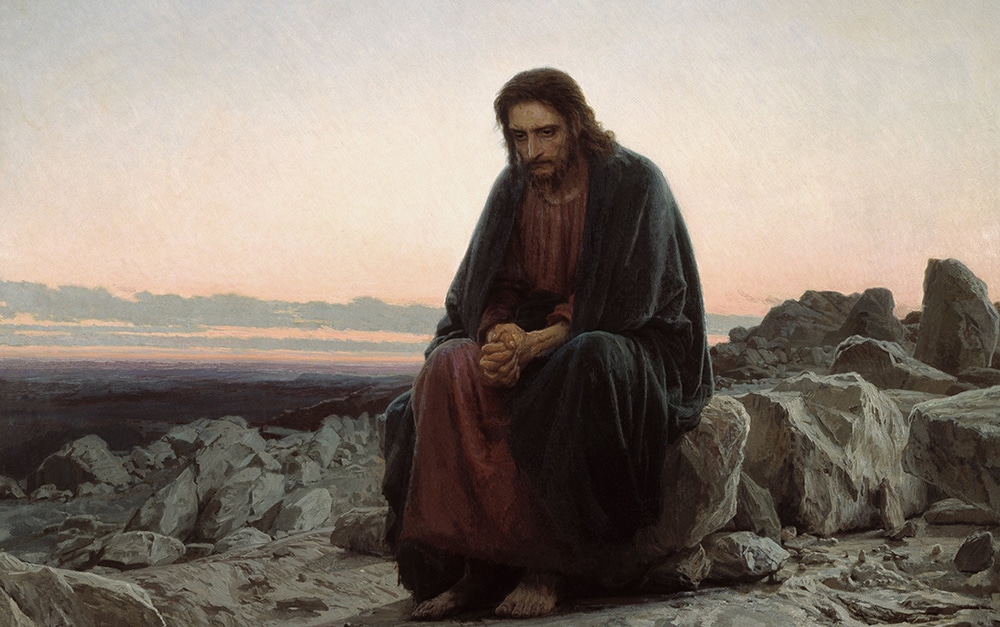
This claim revealed an impoverished understanding of the Lenten penitential practice. Penance is not a mode of self-punishment, whereby we, the Christian, prove our mettle against our bodies.
This focus puts Lent squarely on us. Through our superhuman practices, we will celebrate a festive Easter.
| February 21 – First Sunday of Lent |
|---|
|
Gn 9:8-15
Ps 25:4-5, 6-7, 8-9
1 Pt 3:18-22
Mk 1:12-15
|
The Gospel for the first Sunday of Lent, if we are attentive, forms us in the proper disposition for keeping a holy Lent. Lent is not about our toil but following Jesus Christ into the desert of divine desire.
Jesus goes into the desert.
As a symbol, the desert immediately recalls for us a desolate space. There is no food, no water, no other human beings, just mile after mile of wind-blown, sandy terrain. Silence is the only companion.
In holy Scripture, such natural symbols are taken up by the divine pedagogy. Israel, after leaving Egypt, enters the desert. In this desert, God bestows manna from heaven. God gives the Law. God accompanies Israel in their newfound freedom, a liberation they often reject for the comfortable idols of Egypt.
Jesus enters the desert just as Israel did. Forty years for Israel, 40 days for Christ. The desert is the space where God dwells with us, where the desire for obedience to God’s commandments is to be cultivated.
Jesus is tempted in this desert by Satan. Mark tells us nothing about this temptation. The silence of Mark speaks like the silence of the desert.
What tempted Jesus?
Well, what tempted Israel?
The desire to rely on its own power. The refusal to trust God entirely.
Alone with the Father, we can only imagine the temptations that the devil placed before the Son. What could he do if he did his own will, instead of the Father’s? What could he accomplish?
Mark does not describe how Jesus dismisses these temptations. We hear only that Jesus dwelt in peace among the wild beasts. He was ministered to by angels.
Dear friends, this is no mere mortal, no run-of-the-mill son of Israel. Just as Adam dwelt in peace with the creatures of the world, so, too, the Son of Man brings the peace of the kingdom of God through his very presence.
Isaiah’s prophecy has come. The lion and the lamb have laid down in peace through the presence of the beloved Son.
Still, this peace is not yet universal. Mark takes us from the desert of desire to the violence of the earthly kingdom. John is arrested, later to be murdered by the state. He spoke words that no one wanted to hear, a conversion that required too much.
At this very moment, Jesus proclaims the kingdom of God. He tells us to repent. Turn aside from the violence that intoxicates too many men and women and turn to Jesus, the very presence of the kingdom.
Jesus’ announcement speaks to us. Follow Jesus into the desert. Not because your remarkable works pacify the disappointment and anger of God.
No! Follow Jesus, because in him is the kingdom of God. He is the love, the glory of God, come to redeem the world.
As long as we are governed by the violence of the earthly city, of the outer man, don’t be surprised that penance will be part of entering this desert of desire.
But the purpose is not the penance, it’s the love.
It’s the desire.
It’s dwelling with Our Lord.
Timothy P. O’Malley, Ph.D., is the director of education at the McGrath Institute for Church Life at the University of Notre Dame.





